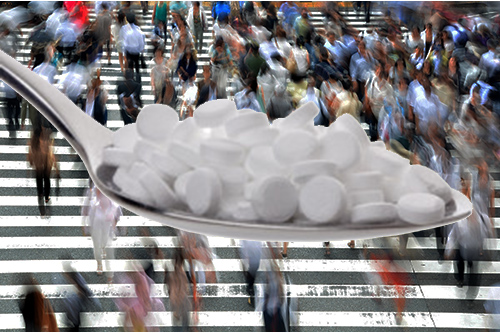


An Overview of Aspartame and Other Sweeteners
In recent decades, artificial sweeteners like aspartame, sucralose, and stevia derivatives have become a staple in the diets of many people. They are often used as an alternative to sugar because they contain fewer calories and do not raise blood sugar levels. However, despite their widespread use, there are controversial discussions about their safety and potential health effects.
In this article, we examine the current scientific evidence, regulatory assessments, and potential risks of artificial sweeteners, particularly aspartame.
What Are Artificial Sweeteners?
Artificial sweeteners are substances obtained either chemically or naturally that add sweetness to foods and beverages without adding the calories of sugar. They are often much sweeter than regular table sugar (sucrose), so only small amounts are needed to achieve the same taste.
The most commonly used sweeteners include:
• Aspartame : A synthetic sweetener widely found in products like diet drinks and sugar-free desserts.
• Sucralose : A calorie-free sweetener made by modifying sugar.
• Stevia : A plant-based sweetener derived from the leaves of the stevia plant.
• Acesulfame Potassium (Ace-K) , Neotame , Advantame , and Saccharin :
Other artificial sweeteners with various applications.
These sweeteners are used in a wide range of products, including "sugar-free" baked goods, soft drinks, candies, yogurts, and even medications.
Regulatory Assessment of Aspartame
Aspartame is one of the most extensively studied sweeteners worldwide. Since its approval by the U.S. Food and Drug Administration (FDA) in 1981, it has been evaluated by numerous international health authorities, including the European Food Safety Authority (EFSA) and the World Health Organization (WHO). The FDA has set an acceptable daily intake (ADI) limit of 50 milligrams per kilogram of body weight, which is considered safe.
In July 2023, the International Agency for Research on Cancer (IARC) published a study classifying aspartame as "possibly carcinogenic to humans." This statement caused global concern. However, the FDA expressed doubts about this conclusion, emphasizing that the scientific evidence for aspartame's carcinogenic effects was insufficient. The Joint FAO/WHO Expert Committee on Food Additives (JECFA) also confirmed that aspartame poses no safety concerns at current usage levels and that the ADI remains unchanged.
Health Concerns and Research
Findings
Despite positive evaluations by many health authorities, there are still controversial studies highlighting potential health risks of artificial sweeteners.
In addition to aspartame, new findings on sucralose are now coming into focus:
Sucralose and Diabetes Risk
A 2023 study published in the journal Nutrients provides alarming evidence that sucralose may promote the development of type 2 diabetes. According to the study, sucralose disrupts the composition of gut microbiota and reduces insulin sensitivity, even at doses below the accepted safety limits. Animal experiments showed that sucralose worsens glucose tolerance and promotes inflammatory processes in fat tissue. While agencies like the FDA continue to emphasize the safety of sucralose when consumed in moderation, the study underscores the need to reassess its long-term metabolic effects on humans.
Despite positive evaluations by many health authorities, there are still controversial studies highlighting potential health risks of aspartame.
Some of the key concerns include:
1. Carcinogenic Effects :
A 2006 study by the Ramazzini Foundation found that aspartame could cause leukemia and lymphomas in rats, even at doses below the ADI. Follow-up studies suggested that these carcinogenic effects are amplified with prenatal exposure.
2. Effects on the Brain :
Aspartame breaks down in the body into phenylalanine, methanol, and aspartic acid. These substances can be neurotoxic in high concentrations. Animal studies have shown that aspartame can damage brain cells and cause cognitive impairments. In humans, migraines and epileptic seizures have been linked to aspartame consumption.
3. Impact on Puberty :
A recent study in Molecular Nutrition & Food Research showed that aspartame may delay puberty development in female rats and girls. The sweetener disrupts the hypothalamic-pituitary-gonadal axis and alters the composition of gut microbiota.
4. Endocrine Disruption : Aspartame is also considered an endocrine disruptor that may interfere with hormonal processes in the body.
Natural Alternatives and Recommendations
Given the controversial data, some experts recommend avoiding artificial sweeteners and opting for natural alternatives instead.
These include:
• Stevia : A natural sweetener with high sweetness. Stevia is a plant-based sweetener derived from the leaves of the Stevia rebaudiana plant. Through an extraction process, the sweet compounds steviosides and rebaudioside A (Reb A) are isolated, which are 200 to 350 times sweeter than regular table sugar. Stevia is calorie-free, does not affect blood sugar levels, and is considered tooth-friendly. However, some people may find it leaves a bitter aftertaste, especially if not sufficiently purified.
• Erythritol : A sugar alcohol that contains few calories and is well-tolerated.
• Honey or Maple Syrup : Natural sweeteners that, while containing calories, also provide valuable nutrients.
• Organic Sugar from Cane Molasses : A less processed alternative to regular sugar that contains minerals like iron and magnesium. It has a mild caramel flavor and is available in organic quality. However, this sugar should also be consumed in moderation, as it is calorie-dense and affects blood sugar levels.
Conclusion
The debate over artificial sweeteners remains complex: While aspartame has been controversially discussed for decades, newer studies on sucralose raise additional questions. In particular, the link between sucralose and metabolic disorders like diabetes highlights that the current risk assessment may be outdated. Consumers should be aware that even calorie-free sweeteners are not automatically harmless and that a balanced diet favoring natural alternatives is preferable.
Sources : • FDA: Aspartame and Other Sweeteners
